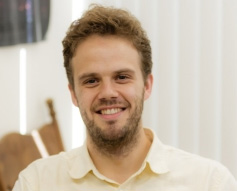Johan Samsing receives EU Marie Skłodowska-Curie Fellowship
Johan Samsing, Einstein and Spitzer Fellow at Princeton University, has received a 2-year EU Marie Skłodowska-Curie Fellowship to join the NBIA in December 2019.

The recent pioneering observations of gravitational waves from merging black holes by LIGO/Virgo have already led to new remarkable insight: From the first few events it is clear that black holes do indeed exist, that Einstein's General Relativity seems to very well describe their merger and ring-down evolution, and that Nature is able to pair black holes in compact binary systems. However, many astrophysical key questions still remain unsolved, including, how and where black holes form and what helps them to get close enough to merge on an observable timescale. The project Johan Samsing has proposed will provide new state-of-the-art insight into such fundamental questions by addressing how binary black holes form and merge in dense stellar systems, as well as how well one can infer their origin from their emitted gravitational wave signal. In order to achieve this goal, Johan Samsing will develop a new numerical Monte-Carlo framework for evolving dense stellar systems, which for the first time will include, among others, stellar tidal interactions and corrections from general relativity during strong few-body scatterings.
